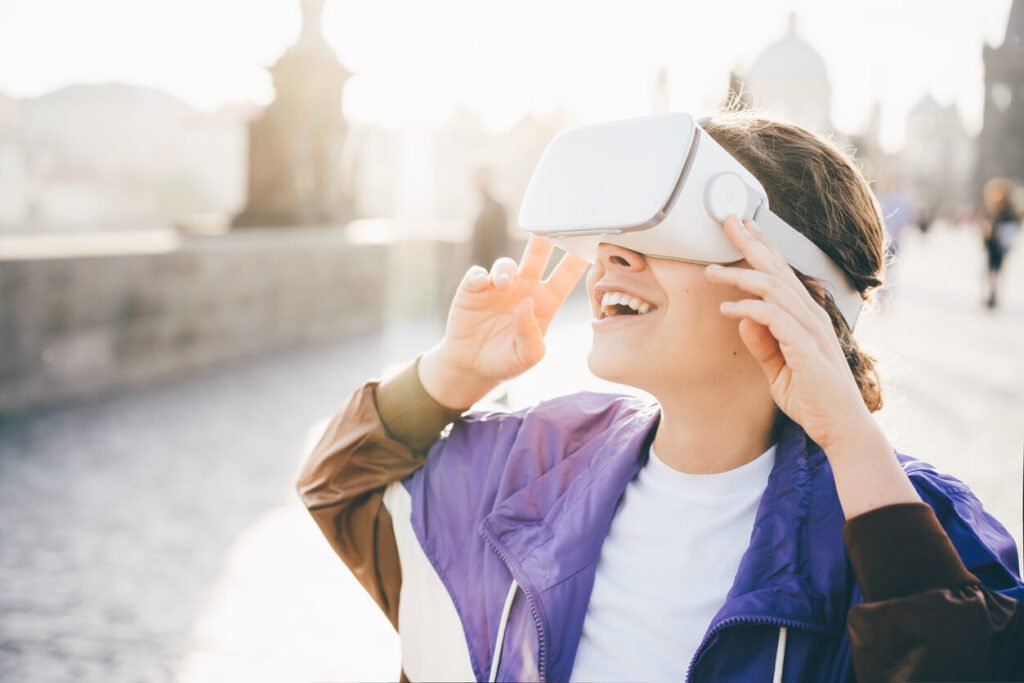In the bustling metropolis of Lagos State, Sarah sat in her cozy apartment, scrolling through her social media feed. As a travel enthusiast and aspiring influencer, she yearned for adventure and exploration, but the constraints of time and budget kept her grounded.
One evening, while browsing through travel blogs and Instagram posts, Sarah stumbled upon a virtual reality (VR) travel experience that piqued her curiosity. With just a few clicks, she found herself transported to the sun-kissed beaches of Santorini, Greece, where she could almost feel the warmth of the Mediterranean sun on her skin and hear the gentle lapping of waves against the shore.
Intrigued by the possibilities of virtual travel, Sarah delved deeper into the world of VR tourism. She discovered a plethora of immersive experiences, from virtual city tours to interactive cultural exhibits, all accessible from the comfort of her own home. With the rise of technology, the boundaries of traditional tourism were expanding, offering new avenues for exploration and discovery.
As Sarah continued to explore virtual travel, she realized the potential for influencers to shape and influence the travel experiences of their followers. With the power of storytelling and immersive content, influencers could transport their audience to far-off destinations and inspire them to embark on their own virtual adventures.
Driven by her passion for travel and technology, Sarah decided to embark on a new journey as a virtual travel influencer. Armed with her VR headset and creative storytelling skills, she set out to curate engaging content that would transport her audience to exotic locales around the world.
Through her virtual travel experiences, Sarah not only entertained and inspired her followers but also provided valuable insights and recommendations for future travels. From virtual hotel tours to immersive culinary experiences, she showcased the best of what the world had to offer, all through the lens of virtual reality.
As Sarah’s influence grew, so did the popularity of virtual travel among her followers. With each new post and video, she sparked a sense of wanderlust and curiosity, encouraging her audience to explore the world in new and innovative ways.
In the ever-evolving landscape of tourism and technology, virtual travel influencing emerged as a powerful force, bridging the gap between imagination and reality. Through the lens of virtual reality, travelers like Sarah could embark on incredible journeys, inspiring others to do the same and shaping the future of tourism in the digital age.
As Sarah reflected on her journey, she marveled at the transformative power of technology and the boundless possibilities of virtual travel. With the world at her fingertips, she looked forward to continuing her adventures and sharing her passion for travel with audiences around the globe.
In the dynamic world of leisure and tourism, the role of education cannot be overstated. From honing specialized skills to staying abreast of industry trends, continuous learning is essential for professionals looking to thrive in this fast-paced sector.
Across the globe, educational institutions and online platforms offer a myriad of courses tailored to the diverse needs of the leisure and tourism industry. Whether it’s mastering the art of event planning, delving into the nuances of hospitality management, or exploring the intricacies of destination marketing, these courses provide invaluable insights and practical skills that can elevate professionals to new heights in their careers.
Moreover, the benefits of education in leisure and tourism extend far beyond individual career advancement. A well-educated workforce contributes to the overall growth and sustainability of the industry, fostering innovation, enhancing service quality, and driving economic development in tourism-dependent regions.
As the industry continues to evolve, so too must the skills and knowledge of its workforce. From emerging technologies to shifting consumer preferences, staying ahead of the curve requires a commitment to lifelong learning and professional development.

